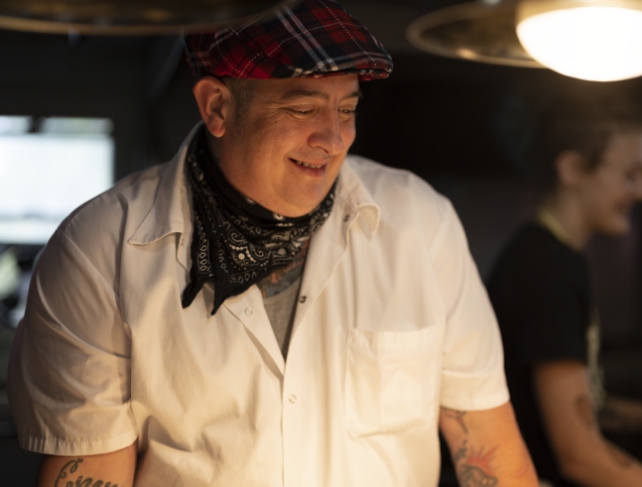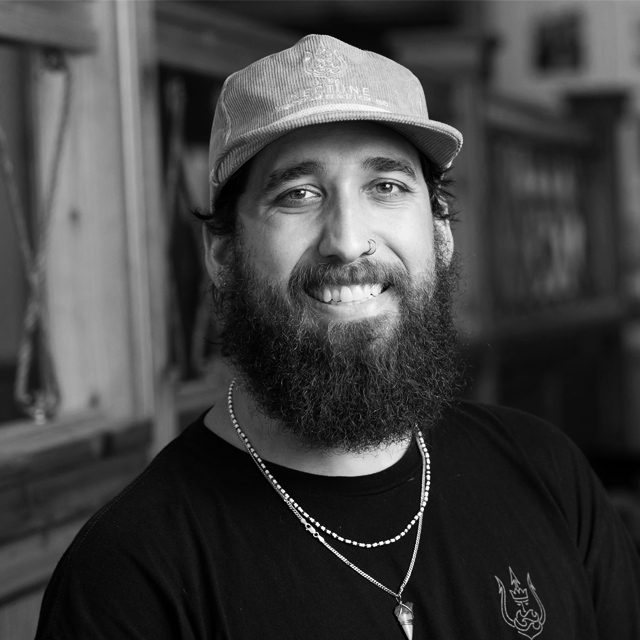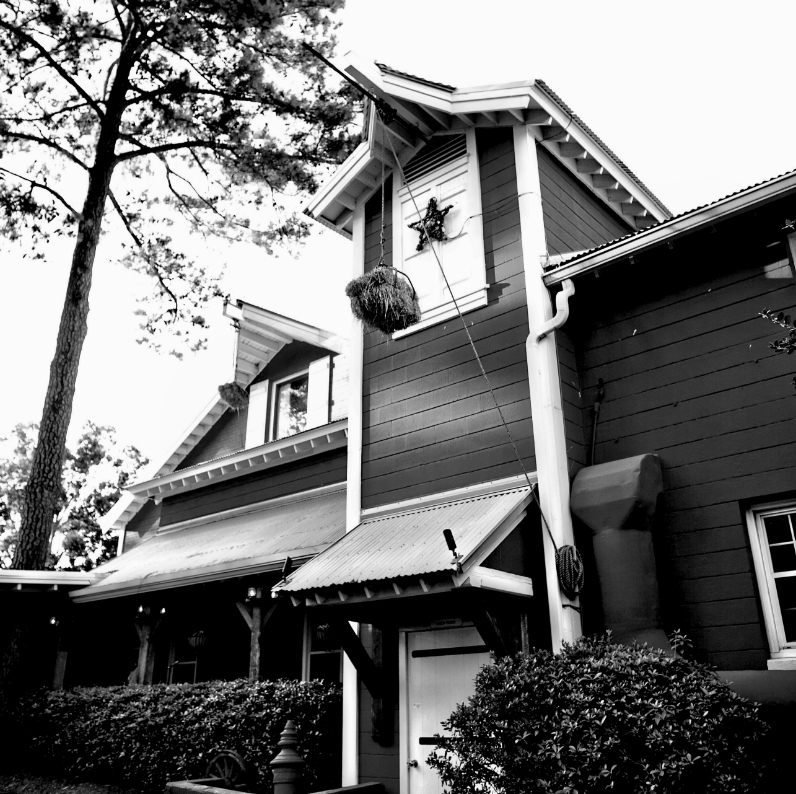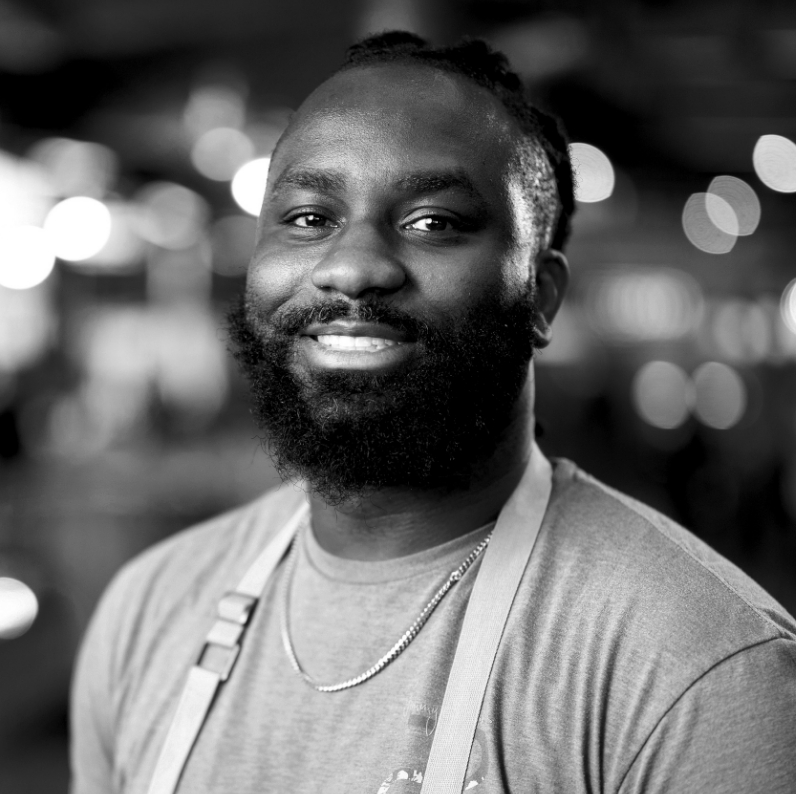Steven
Goff

chef/owner,
Tastee Diner
Goff’s career path
- Fast Food Cashier
- Fast Food Cook
- Dishwasher
- Executive Sous Chef
- Food Truck Chef/Operator
- Chef/Owner
Meant To Serve: Steven Goff’s Transformation
Despite his rocky past, restaurants have always felt like home to this Asheville-based chef-owner who’s filled nearly every role in hospitality.
Incarcerated. Homeless. Former addict. And heavily tattooed.
By many accounts, Steven Goff didn’t stand a chance at success. A culinary instructor even said as much one day because of Goff’s many tattoos.
But here’s what Goff does have: a tireless work ethic, an unshakeable spirit, and a heart for hospitality.
In a career that spans decades, multiple states, and countless roles, Goff has accepted that hospitality is how he was meant to serve. As chef/owner of Tastee Diner, his home base is an offbeat spot in West Asheville, where he and his staff serve breakfast, lunch, and dinner, daily. Goff feeds paying customers alongside those who can’t afford to pay. He’s truly created a place where hospitality extends to all.
Jack of all tasks
Goff was 15 when he got his first restaurant job—as a McDonald’s cashier—and hospitality has been his livelihood ever since. After a few fast-food restaurant experiences, he landed at O’Charley’s, where he expanded his skill set. There, he became indispensable as a busser, server, host, cook, and dishwasher.
I’m actually super-grateful for all my time in fast food and corporate restaurants because I wasn’t focused on trying to be a chef, I was just learning how to be fast.
“I was just the fill-every-need person,” he recalls. “I was working four or five 12-hour days a week between all my different things at the restaurant. But it taught me how to be a manager, and I’m actually super-grateful for all my time in fast food and corporate restaurants because I wasn’t focused on trying to be a chef, I was just learning how to be fast.”
Goff says the restaurant was where his friends were, so he wanted to be there more than anywhere else. But despite his early success at work, Goff struggled in other areas. He’s had a criminal record since he was 13. After O’Charley’s, he hopped freight trains across the country for a while, but always found a home in restaurants.
“Restaurants always need cooks and dishwashers. So, no matter what city you’re in, they need you,” he says. “I always stayed in those kitchen jobs because I needed you to need me. I needed to be needed. So, if I know every role, you can’t fire me. That’s the thing I tell people: As soon as you get a job, make yourself needed. Make it so that they don’t like it when you’re not there.”
While in San Francisco, Goff worked at a nonprofit that employed homeless and at-risk youth across various businesses. There weren’t any openings at the restaurant, so he worked at the thrift store. Teens could only remain in the program for a year. Goff advanced to an assistant manager role and could have stayed beyond his allotted time for a permanent position. But he turned it down and headed home to South Carolina, where he found work at another restaurant—and less access to drugs and other things he needed to steer clear of.
Since then, Goff’s numerous hospitality roles have included executive sous chef, managing restaurant partner, and culinary school lodge manager. He even managed a high-end butcher shop and was a gourmet store barista. From low end to high end, he’s loved all his hospitality jobs, he says, crediting those early fast food years as especially formative.

“I wish more young culinarians had experience in fast food or corporate [restaurants]. They’re such cool and different settings,” Goff says. “It really sets those foundational skills.”
I wish more young culinarians had experience in fast food or corporate [restaurants]. They’re such cool and different settings. It really sets those foundational skills.
Hospitality and purpose
After his daughter was born in 2006, Goff considered other professions that didn’t require working weekends. He enrolled in community college programs to learn the welding, plumbing, and HVAC trades. But nothing clicked the way hospitality did.
He was working in Raleigh, part-time as a barista and part-time in the kitchen when he finally realized that hospitality was how he was meant to serve.
“That’s when it was like, just accept who you are and what you do. I think so many people would be happier if they realized that,” he says.
Since landing in Asheville, Goff has graduated from the culinary and baking programs at Asheville-Buncombe Technical Community College and is just a few classes shy of completing the hospitality management program. Turns out, the perfect time for school was after he had had a decade in the industry under his belt, he says.
“You have your work ethic [established], and you have things figured out,” he says. “You know the basics of what should happen in a restaurant setting, whether you’re going for hospitality management or culinary or baking. You at least have some idea of what you’re getting yourself into.”
Many roles and responsibilities
Goff loves that hospitality offers so many roles and career options. He also sees it as a vehicle for serving the community beyond his restaurant. He’s an adjunct culinary instructor and mentors and networks with other chefs and culinary instructors. He also serves as a judge or an advisor at community college-level culinary competitions.
“I just try to make sure that we’re supporting the community in every way possible,” he says.
That also means feeding those in need around Asheville. There’s a wooden box in front of the restaurant, where staff might leave canned goods, blankets, or even a basket of fries at the end of the night. Customers can also buy a meal for someone who needs it. And if anyone needs a job, he’s likely to give them one. It doesn’t matter how many tattoos they have, if they’re homeless, or if they struggle with addiction.
“I just have to always give someone a chance,” he says. “You’ve got to be raising the reddest of flags for me to not give you at least one shot.”
Pro tips Q&A
Goff discusses finding where you belong, networking, and the challenges of and opportunities in operating a restaurant in a town with a reputation as a culinary mecca.
I knew that restaurants made me happy. I was really into the punk scene. I love really loud, chaotic, abrasive madness. That’s what a kitchen can be. So, it felt like home. And honestly, for a long time, the kitchen was the land of misfit toys. That was where we all went.
A: One reason I love to do events is because I can see the other chefs around the town or state or whatever kind of event I’m doing. We can all share what we go through on the day to day, whether that’s finding employees in general to come into our industry or work or rent issues or “Oh wow, beef went up by two bones or two bucks a pound.” We’re able to commiserate over that.

On belonging:
Q: How did you know that restaurants were where you fit in?
A: I knew that restaurants made me happy. I was really into the punk scene. I love really loud, chaotic, abrasive madness. That’s what a kitchen can be. So, it felt like home. And honestly, for a long time, the kitchen was the land of misfit toys. That was where we all went.
On industry networking:
Q: Is there a perception that there’s more competition than collaboration between chefs and restaurant owners?
The more we collaborate, the stronger we make our industry. And that’s why organizations like NCRLA or the Asheville Independent Restaurant Association or the Piedmont Culinary Guild—these are all organizations I’m part of—are important. It makes us stronger to be together because there aren’t many of us, and it just takes a team.
On staffing:
Q: Asheville is a top tourist destination for its proximity to Great Smoky Mountains National Park and the Appalachian Trail. It’s also known for its robust food and beer scene, which presents both challenges and opportunities. How does being a top tourist destination impact staffing shortages and culinary creativity?
A: Here’s one thing that I love that I’ve taken away from the staffing shortage: People have to pay better wages. I’m typically on the forefront of higher wages or have been in the past. I still am. We pay a living wage here. The people who weren’t going to do that are now forced to do that.
It’s time to accept that hospitality industry workers are human beings. They have lives, and they’re regular people. If you don’t want to pay the prices for them to have living wages, we’re not going to have them around to serve you.
Search for your next career move today.
browse jobs







